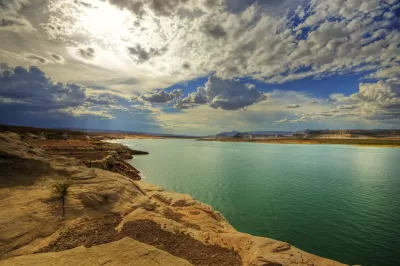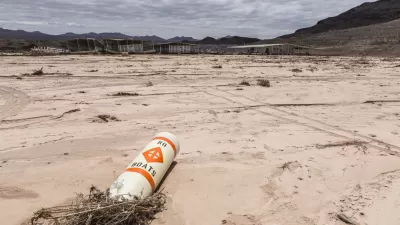With warmer temperatures sapping the flow of water and communities clamoring for higher volumes, the Colorado River needs strict management to continue serving millions of people and farms.

The Colorado River, which supplies water to 40 million people in seven western states, faces a crisis as its resources are stretched thin and climate change threatens its future. Its two largest reservoirs, Lake Mead and Lake Powell, are both below 50% capacity, and the drying trend continues as rainfall in the region remains lower than normal. Sammy Roth interviewed Jeff Kightlinger, the general manager of Southern California's Metropolitan Water District, the entity responsible for operating the Colorado River Aqueduct and distributing water to almost 19 million people.
Kightlinger admits there are formidable challenges facing Southern California as climate change accelerates warmer and drier conditions and growing populations demand more water. He suggests that the Imperial Irrigation District (IID), which serves the Imperial Valley and uses the largest share of the Colorado River's water, must "become a responsible, reliable" partner in the Drought Contingency Plan that California and neighboring states have developed in order to manage the Colorado's limited resources. The IID wants to see more resources directed toward stabilizing the Salton Sea, a major ecological challenge for the area.
"The next 25 years look like it’s going to be a real hard haul," Kightlinger says, "but I believe it’s doable, as long as the parties can be smart and work together."
FULL STORY: Boiling Point: Climate change spells trouble for the Colorado River. But there’s still hope

Alabama: Trump Terminates Settlements for Black Communities Harmed By Raw Sewage
Trump deemed the landmark civil rights agreement “illegal DEI and environmental justice policy.”

Study: Maui’s Plan to Convert Vacation Rentals to Long-Term Housing Could Cause Nearly $1 Billion Economic Loss
The plan would reduce visitor accommodation by 25% resulting in 1,900 jobs lost.

Planetizen Federal Action Tracker
A weekly monitor of how Trump’s orders and actions are impacting planners and planning in America.

Waymo Gets Permission to Map SF’s Market Street
If allowed to operate on the traffic-restricted street, Waymo’s autonomous taxis would have a leg up over ride-hailing competitors — and counter the city’s efforts to grow bike and pedestrian on the thoroughfare.

Parklet Symposium Highlights the Success of Shared Spaces
Parklets got a boost during the Covid-19 pandemic, when the concept was translated to outdoor dining programs that offered restaurants a lifeline during the shutdown.

Federal Homelessness Agency Places Entire Staff on Leave
The U.S. Interagency Council on Homelessness is the only federal agency dedicated to preventing and ending homelessness.
Urban Design for Planners 1: Software Tools
This six-course series explores essential urban design concepts using open source software and equips planners with the tools they need to participate fully in the urban design process.
Planning for Universal Design
Learn the tools for implementing Universal Design in planning regulations.
Caltrans
Smith Gee Studio
Institute for Housing and Urban Development Studies (IHS)
City of Grandview
Harvard GSD Executive Education
Toledo-Lucas County Plan Commissions
Salt Lake City
NYU Wagner Graduate School of Public Service





























